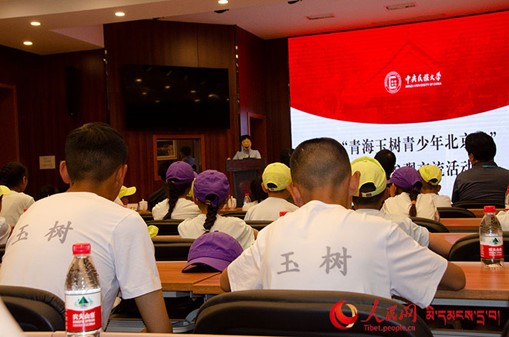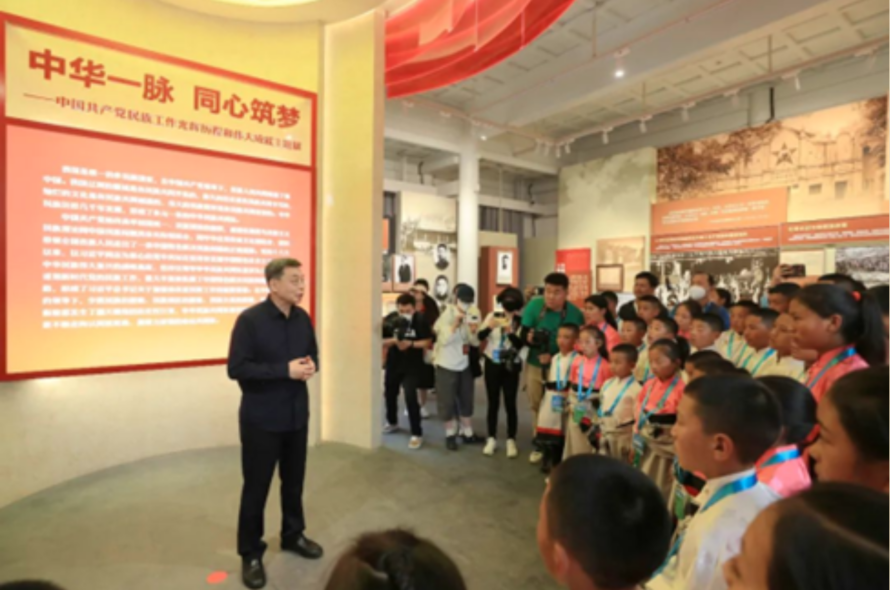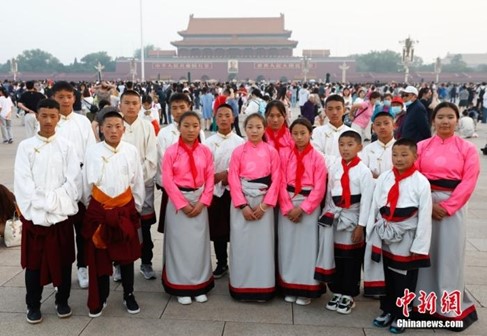China’s authorities in Tibet are underscoring their intent to indoctrinate Tibetan children by implementing “national unity education” in a model kindergarten in Lhasa, according to Chinese state media reports from early June 2023.
Children presumably younger than 5 or 6 are attending the institution, which attempts to make the concept of national unity ”penetrate the blood and soul” of the children, according to the kindergarten’s director.
In another recent instance of China’s drive to indoctrinate Tibetan children, 40 Tibetan children from the Yulshul (Chinese: Yushu) Children’s Welfare Center, Yushu (Kyegu) Tibetan Autonomous Prefecture (the Tibetan area of Kham), were taken to Beijing at the end of May this year on a “research trip to the motherland,” corresponding with China’s Children’s Day on 1 June. Significantly, Pan Yue, the minister of the National Ethnic Affairs Commission and deputy head of the United Front Work Department, lectured the children about “love of the party and the nation,” as several Chinese state media outlets report.
The International Campaign for Tibet is deeply concerned about China’s continuous and systematic indoctrination drive against Tibetan children, which begins at an early age and apparently aims to replace an authentic and self-determined Tibetan culture with Chinese Communist Party ideology.
Recently, independent United Nations experts expressed concern that Tibetans, among others living under the CCP’s repressive rule, “face severe restrictions in the realization of their right to take part in cultural life, including the right to use and teach minority languages, history and culture.” The experts called, among other things, for an end to forced relocations of Tibetans and the state-run boarding school system in Tibet.
“National unity”—code for Han-centric, CCP-led assimilation program
China’s drive to indoctrinate Tibetan children is consistent with CCP policies to “Sinicize” Tibetan culture (meaning to bring it under the control of the CCP), and in particular with policies implemented in the so-called Tibet Autonomous Region (TAR), which spans about half of Tibet.
In January 2020, the 11th People’s Congress of the TAR adopted new regulations to establish “model areas for national unity and progress” in the Tibet Autonomous Region. The regulations give government powers to enforce a Han-centric way of life and to cultivate patriotic and vigilant citizens as informants for the party.
The regulations are a legal articulation of long-held policy goals to reduce ethnic differences and achieve a stable Han-centric society in China’s strategically vulnerable border regions. The regulations also reflect the culmination of Chinese President Xi Jinping’s policy focus (to consolidate power in the party and eliminate threats) with the second generation of ethnic policy thinkers in China who advocate for the dilution of ethnic difference, thus enforcing assimilation of Tibetan culture.
In August 2021, Xi Jinping declared at the Central Conference on Ethnic Affairs in Beijing that “All ethnic groups should be guided to always place the interests of the Chinese nation above anything else, with their consciousness of different ethnic groups serving the sense of community for the Chinese nation as a whole.”
Jiangsu Experimental Kindergarten–promoting “national unity” at early age
The Jiangsu Experimental Kindergarten, in Tibet’s capital of Lhasa with an overwhelming number of Tibetan students enrolled in it, has been imparting an education aimed at forging the “consciousness of the Chinese nation community” The kindergarten apparently is part of a larger institution that offers junior and high school education as well.
The kindergarten’s Director Dong Shiwen claimed the kindergarten has long regarded strengthening national unity education as the sole project for cultivating the next generation and has taken multiple measures to realize the educational mission of “educating people for the party and talents for the country.” He attributed the effort to Xi Jinping’s emphasis on national unity and progress education as the basis for strengthening national unity. The school also strives to lead the effort to create a model area of national unity and progress and has established a leading group for the establishment of a model district for ethnic unity and progress.
The director further stressed that the teaching method at the kindergarten allows the concept of national unity to “penetrate the blood and soul.” Young Tibetan children are made to sing patriotic songs from the 1990s like “Love my China” which says, “56 ethnic groups, 56 flowers, 56 siblings are family.”
Built in 2014 with funding of 263 million yuan ($38.3 million) by the government of Jiangsu Province, the apparent umbrella institution, the Lhasa Jiangsu Experimental High School, after its inception, hosted 2,472 students and 20 educators from Jiangsu and provides boarding facilities for both junior and senior high school students according to Chinese state media. 90% of the students are Tibetan, according to a 2016 report by the Tibetan Centre for Human Rights and Democracy.
According to the school President Ma Hua, Jiangsu province has sent nearly 200 teachers in five batches to the school since its opening in 2014, helping churn out nearly 14,000 graduates, according to a state media report from 2022.
With Tibetan language skills already disincentivized in the job market, the replacement of Tibetan teachers with state-trained Chinese teachers further diminishes Tibetan children’s ability to learn their mother tongue.
Like the Lhasa Jiangsu Experimental High School, the Lhasa Beijing Experimental High School was also built in 2014 with a team of Beijing teachers sent to work in the school. The Ministry of Education followed up with a project in 2016 to send 800 teachers and principals from middle and primary schools in 17 provincial-level administrative regions every year to work in local schools in teams.
The TAR government in 2020 reported that it has “improved” more than 900 primary and high schools, and established 1,168 new rural kindergartens since 2016 with the sending of funds and teachers from inland regions by the central Chinese government. This indicates that a multi-layered assimilationist education system in the TAR and across other Tibetan areas has chipped away, one by one, all elements of education that are based on Tibetan culture.
In September 2021, the Chinese Ministry of Education implemented a decree to teach Mandarin Chinese to all preschool children. The “Children homophony plan for Putonghua Education for Preschool Children” first announced in July 2021 sought to lay a strong foundation for standard Mandarin language and help “foster a sense of community for the Chinese nation.”
Research trip to the “motherland” on Children’s Day
The focus on raising young Tibetan children to be patriotic and develop a sense of the community of the Chinese nation early on is not restricted to experimental schools in Tibet’s capital but spans across the Tibetan plateau in all institutions of education.
From 30 May to 3 June, 40 Tibetan children from the Yushu Children’s Welfare Center were taken to Beijing on a “research trip to motherland” corresponding with Children’s Day on 1 June in China.
Organised by “China News Service” in collaboration with the Yushu Prefectural people’s government and “Beijing Aid to Youth Headquarters,” state-affiliated media reported the activity as the first activity of the Sino-Singapore Charity’s “Dream Realization Project,” Yu Lan, president of China News Network, described the trip as a journey to “experience the community of the Chinese nation” and a study tour with the theme of “motherland.”
Besides visits to the Palace Museum, the Great Wall and National Stadium, a host of more tailored activities were organized.

Children were taken to the National Center for the Performing Arts, where they saw performances on the theme of “Growing up with our motherland,” and to the Minzu University of China, where they attended a history lecture by a senior professor.
On Children’s Day, the group was taken to the “Chinese Nation Community Experience Hall,” reportedly the former site of a Mongolian and Tibetan school and shown a performance by the “China ethnic song and dance ensemble.”
Pan Yue, Minister of the National Ethnic Affairs Commission and deputy head of the United Front Work Department, gave a history lesson to the children and echoed General Secretary Xi Jinping’s message for the occasion, calling for children to live up to the “love of the party and the nation” and to become members who can shoulder the responsibility of “executing the rejuvenation of the Chinese nation in the new era.”

The minister also advised the students to voluntarily develop a sense of Chinese community early on and to protect ethnic unity “like one would protect one’s eyeballs.”
Older children were taken to a flag-raising ceremony at Tiananmen Square in traditional costume, where Chinese democracy activists and students were massacred on June 4, 1989.

The state media report of the trip concluded that the children have “understood and enriched their understanding of Chinese history, Chinese culture and the grand concepts of the Chinese nation.”